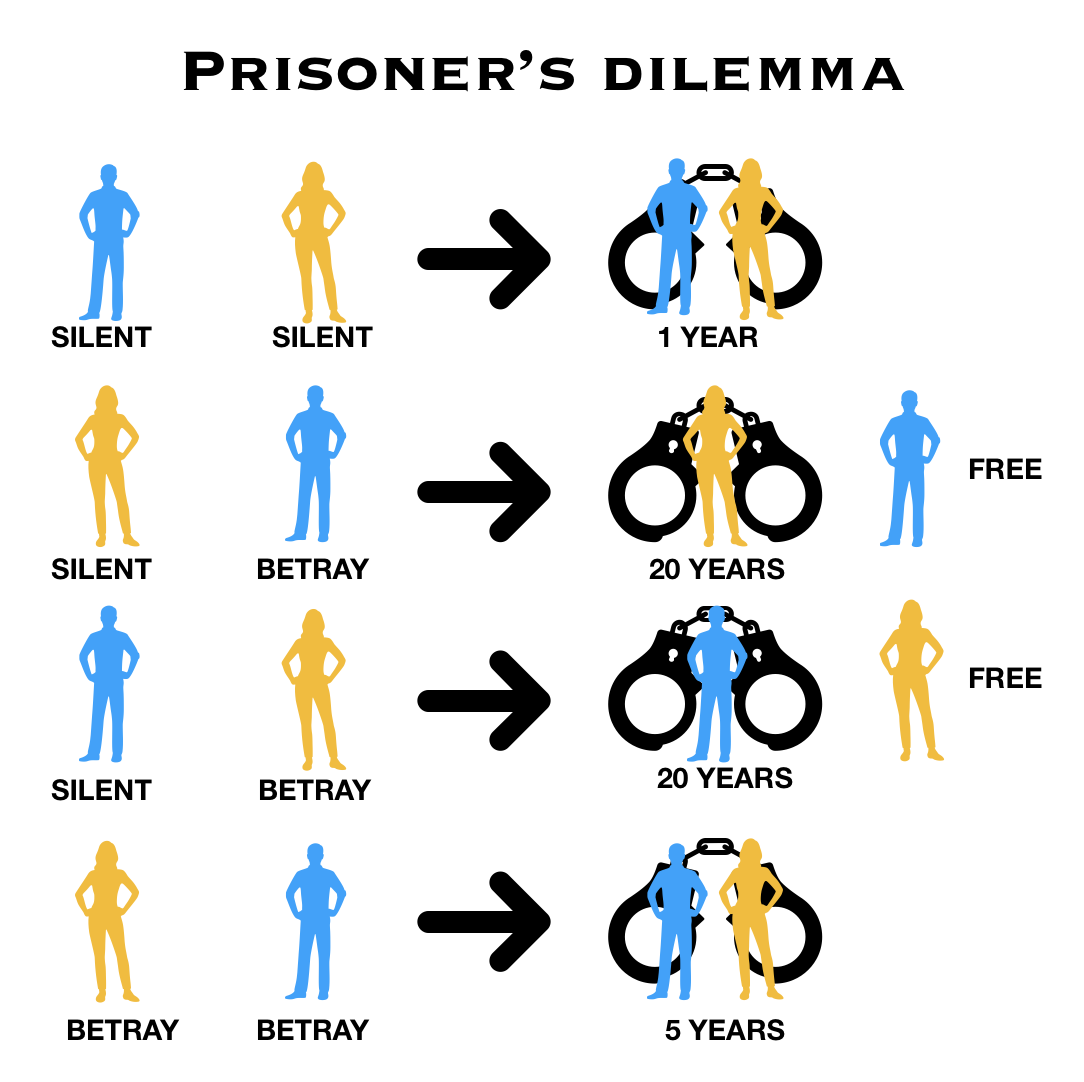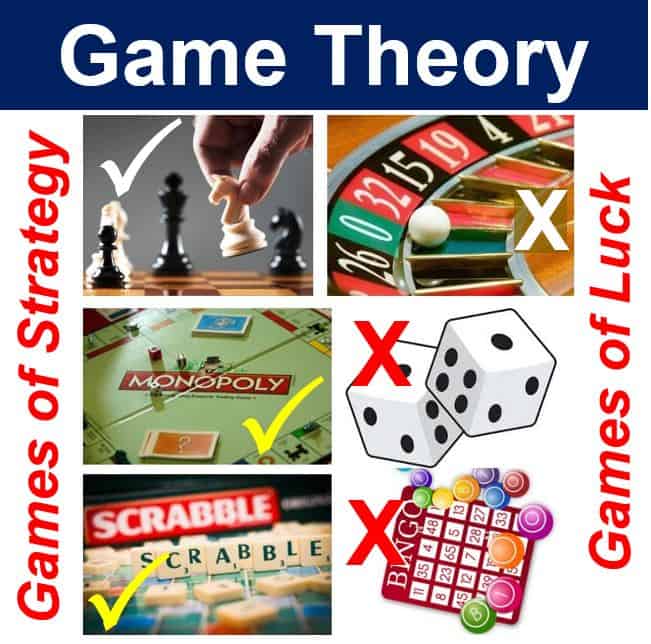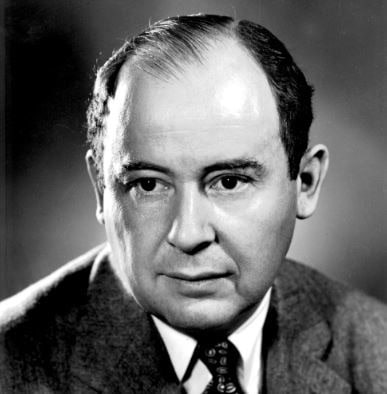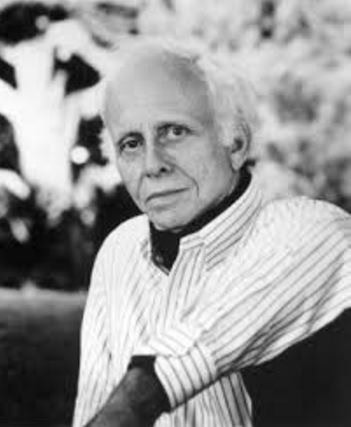Game theory is the study of how and why we make decisions. It is the formal study of conflict and cooperation. It is a branch of mathematics concerned with the analysis of strategies for dealing with competitive situations where the outcome of one person’s decision depends critically on the actions taken by other participants. Game theory has been applied in contexts of the marketplace (business), government, all the sciences, and war.
Game theory is found in the financial choices we make, as well as in the study of economics.
It is a game of strategy – not of chance – that is concerned with the analysis of strategies for dealing with competitive situations where the participants try to anticipate each others’ actions and the likely outcomes of those actions.
It is a technique for analyzing how governments, companies and people should behave in strategic situations where they have to interact with each other. In deciding what to do, they have to take into account what others will probably do and how they might respond to what they themselves do.

You are one of the prisoners arrested on suspicion of a crime. The police are not sure who did it. They have arrested another suspected. You cannot talk to him. You assume he is selfish, so he is unlikely to remain silent. You can either remain silent or betray him. Your best option is to betray – to talk – to testify that he did it. In game theory, this is called the ‘dominant strategy’ (the best strategy after looking at all the options and possible outcomes).
Game theory in the marketplace
In the world of business, competition between two companies can be analyzed as a game in which the participants play to achieve a long-term competitive edge, maybe even total domination – monopoly.
Game theory helps each participant develop his or her optimal strategy for, for example, pricing products, determining when to launch a product, or deciding how much to produce. It can help a company anticipate beforehand what its rivals will do and shows how best to respond if a competitor surprises everybody with an unexpected move.

Game theory is a game of strategy – not chance.
During the Cold War, the strategic decisions of two major participants – the Soviet Union and the United States – were often viewed as an exercise in game theory. In that game, the ‘players’ being observed were the two superpowers.
Game theory is much more than a game, it is about how and why people make business decisions – in fact, virtually any decision based on valuing likely outcomes.
The participants in the game make choices based on how they value the potential outcomes of what they choose. This is also true in cases where one person’s decisions only affects that single person.
In the 1940s, from the field of game theory came zero-sum games, where one player’s gain is equivalent to another player’s loss.
Game theory example – prisoner’s dilemma
In the example ‘Prisoner’s Dilemna’, you can immediately understand why many believe that the best choice in game theory is not to cooperate with the other participant, but to betray him or her.
Imagine that two people are arrested at the same time for the same crime. However, the police are not sure which person is guilty, and which individual abetted the crime.
Each arrested person faces a number of choices:
– If neither prisoner speaks, they will both be released.
– If prisoner A betrays prisoner B, prisoner A will be released and B will go to prison for a very long time. If B betrays A, B will go free and A will be imprisoned for a long time.
– If they both choose betrayal, they will both go to prison, but for a much shorter time.
If you are one of the prisoners and all you care about is yourself, the best way to be sure of not going to prison for a long time – the shortest sentence – is to betray the other prisoner. Regardless of what happens, you get a shorter sentence if you betray than if you do not.
If the other person remains silent and does not betray you, then if you betray him you will be released instead of going to jail for six months. If the other prisoner betrays you, and then you betray him, you will go to prison for two years rather than ten.
Put simply, ‘betrayal’ is your safest strategy, hence it is called the ‘dominant strategy’.
In game theory, which can be used to describe thousands of situations that do or can happen, such as an arms race or wage negotiation, a dominant strategy is the one that is most likely to deliver the best result for the player, regardless of what any of the other players might do.

As a unique field, game theory did not really exist until John von Neumann (1903-1957), a Hungarian-American physicist, mathematician, inventor, computer scientist and polymath, published a paper in 1928. He co-authored ‘Theory of Games and Economic Behavior’ in 1944. (Image: Wikipedia)
Prisoner’s Dilemma in business world
The Prisoner’s Dilemma can be applied to real situations in the business world.
Imagine that a country has just two carmakers, Ford and Toyota. They both agree to sell a set number of cars in that country – if neither of them cheats, they can both enjoy excellent profits.
– If Ford only sells the agreed number of cars, and Toyota finds clever ways of selling more cars at below duopoly prices, Ford will lose market share and Toyota will gain.
– If Toyota does not cheat and Ford does, Ford will gain market share and make more profits, and Toyota will lose out.
Ford is better off cheating against Toyota and vice-versa. This logic holds true whether discussing carmakers, computer giants, smartphone makers, advisors, salespeople, etc.

George Burr Leonard (1923-2010), an American writer, editor and educator who wrote extensively about human potential and education, once said: “In terms of the game theory, we might say the universe is so constituted as to maximize play. The best games are not those in which all goes smoothly and steadily toward a certain conclusion, but those in which the outcome is always in doubt.” (Image: likesuccess.com)
If the prisoners were countries
If some of the details were altered, the prisoner’s dilemma would have a different result. If the prisoners were able to sit together and have a chat and plan for the future, they might opt for cooperation rather than betrayal.
If we apply this situation to countries rather than prisoners, the same applies. If countries can talk to each other and plan for the future, cooperation makes more sense than betrayal, because they both hope that they will make the other nation help them in the future.
In game theory, this is known as a ‘repeated game’. If the players really care about each other – if they are altruistic – they may accept going to jail so that they can help the other prisoner.
In real life situations, the word ‘game’ is misleading. Even though game theory applies to games like chess, monopoly, etc., the concept of ‘game’ merely means any interactive situation in which the participants share a set of rules and consequences.
Penn Fraser Jillette, an American comedian, magician, juggler, inventor, actor and best-selling author, known for his advocacy of free-market capitalism, libertarianism, scientific skepticism and atheism, once said: “I think voting for the lesser of two evils in game theory always leads to more evil.” (Image: twitter.com/pennjillette)
Basic requirements in game theory
When putting a game theory into action, all participants need to have knowledge of the following:
- Who the participants are.
- What the participants know.
- What decisions they are allowed to make.
- All the participants are assumed to be rational.
- How each action taken affects the outcome of the game.
In some models, knowledge regarding additional factors are needed.
In game theory, every participant has to anticipate the reaction of those affected by a decision. In the world of business, this means companies or entrepreneurs have to anticipate the reactions of investors, customers, employees, trades unions, other members of the board, or rivals.
The Nash Equilibrium is a key concept in game theory – it occurs when each player is seeking their best possible strategy, while knowing all the options available to the other players and what they are most likely to do.
Win-Win: this is a game-theory situation in which both (or all) parties come out winning – there are no losers.
Video – Game theory as a dominant strategy equilibrium
This Economics Detective video explain what game theory is, and present the dominant strategy equilibrium.
